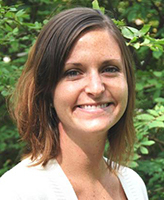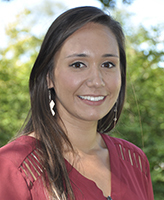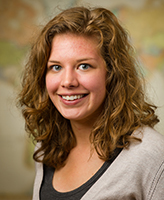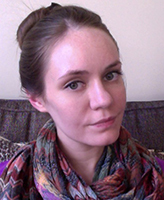Eleven Notre Dame graduate students—including four from the University’s College of Arts and Letters—have been awarded graduate research fellowships from the National Science Foundation (NSF) for the 2014-15 academic year.
Katie Condit, Danielle Fulmer, and Nicole Perez from the Department of Sociology and Charlotte Cunningham from the Department of Psychology were among this year’s winners.
The NSF Graduate Research Fellowship Program recognizes and supports outstanding students in science, technology, engineering, mathematics, and social science disciplines who are pursuing research-based degrees. The award provides a stipend, tuition support, and research funding for three years.
“The NSF Graduate Research Fellowship is one of the most competitive—and prestigious—awards a graduate student can receive,” said Associate Professor Jessica Collett, director of graduate studies in sociology. “Only 32 were awarded in sociology last year. To have three of those in our department is amazing and puts us on par with top programs nationwide.
“This feat is evidence of both the tremendous quality of our students and the support available in our program, from faculty and the Graduate School alike.”
Promoting Equality in Education
 Katie Condit
Katie Condit
Nicole Perez and Katie Condit, both third-year sociology students working in the Center for Research on Educational Opportunity (CREO), have been close friends and colleagues since they came to Notre Dame. The two said they couldn’t believe that after years of preparation, they both won the award. Of the 2,053 fellowship winners nationwide, just 30 were sociologists.
“We commiserated together and waited patiently together,” Perez said. “We always talked about how happy we would be if one of us received the award, but we never talked about the possibility of both of us winning. After we found out, we came to campus and told our advisers together. We were on cloud nine. It was a great experience to go through that with someone.”
Perez’s research focuses on the disparities that Latino students face in education and in expectations. In particular, she is examining the transition from high school to college and how Latino students negotiate their parents’ desires, their own goals, and their peer influences within the high school setting.
“Many Latino students coming from immigrant families know that college is out there, but they don’t really know how to get there,” she said. “We need to make an effort to give them an equal starting point.”
 Nicole Perez
Nicole Perez
Because she has also received the Joseph L. Gaia Distinguished Fellowship in Latino Studies, Perez has decided to defer her NSF fellowship for one year.
She said she feels incredibly privileged to receive these fellowships, which will provide her with the freedom and flexibility to focus on her work.
Condit’s work within CREO focuses on juvenile delinquency in high school students. Her goal is to determine how classroom organization, programming for students with disabilities, and teacher orientation to students impact delinquency rates.
“Here in South Bend, I work for Reading For Life, a diversion program for first-time offenders,” she said. “I’ve always been interested in helping this at-risk population of students, and ideally, I would like my research to promote ways we can better serve them in schools.”
Condit said CREO was the reason she chose Notre Dame’s graduate program. “There are some great sociology departments that have an education focus, but it is so exciting to be able to work in an entire center with abundant resources dedicated specifically to sociology of education research.”
Peacebuilding in Rwanda
 Danielle Fulmer
Danielle Fulmer
Danielle Fulmer, a first-year doctoral student in sociology and peace studies, plans to use her fellowship to study community-level peacebuilding efforts in Rwanda.
Specifically, she will focus on how the participation of women in local peacebuilding initiatives affects their long-term effectiveness.
“Academics and practitioners alike agree on the importance of including women in peace processes, and the role of gender inequality as a risk factor for violent conflict,” Fulmer said. “Community-level peacebuilding efforts are crucial for social change, but more research is needed to understand how these efforts affect conflict recurrence and gender equality over the long term.”
Fulmer will conduct individual interviews and observations in four Rwandan communities, comparing communities that have women actively engaged as peacebuilders with those that do not. She also will study differences that emerge between rural and urban communities.
“Danielle’s research addresses one of the cutting-edge areas of peace studies—the role of women in interventions following armed conflict,” said Ann Mische, associate professor of sociology and peace studies, who serves as Fulmer’s adviser. “This award shows that the social science community acknowledges its importance.”
Patterns in Psychological States
 Charlotte Cunningham
Charlotte Cunningham
Psychology graduate student Charlotte Cunningham focuses her research on longitudinal data within quantitative psychology. She is working to develop methods to analyze within-person variability—or the fluctuations that can occur in psychological states such as memory or affect over time.
“I first started looking at longitudinal data in my undergraduate studies, and I realized that it is a very powerful tool,” Cunningham said. “You can learn so much about the patterns and growth of changes over time.
“For aging populations and people with neurodegenerative diseases and psychological disorders, this kind of data is really valuable for understanding what’s happening.”
One of the greatest benefits of the NSF fellowship, she said, is that she will now have access to the NSF computer cluster, allowing her to run simulations even more efficiently.
Cunningham is the fifth graduate student in the Department of Psychology to be awarded an NSF graduate research fellowship since 2012.
“It was such an honor and a surprise to receive this recognition,” she said. “To have the NSF give their stamp of approval and say, ‘we think you’re good. You’re going to be able to do something.’ That’s really nice.”
A Strong Support Network
All of this year’s winners credited their faculty advisers and the Graduate School’s Office of Grants and Fellowships, led by Associate Program Director Mike Westrate, with supporting them throughout the application process.
The office provides various opportunities for students to hone their applications—through a summer support program, a fall workshop series, and an intensive application-writing boot camp over fall break.
“The support staff was incredible, just reading draft after draft and offering feedback—everything from putting a period or a comma in the right place to thinking through bigger ideas,” Condit said. “That was an incredible help.”
Perez, who participated in the Graduate School’s professional development workshop series and summer support program agreed. “I wouldn’t have been successful without the workshop and my professors.”


